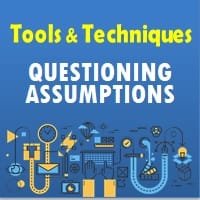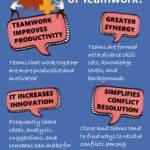
Questioning Assumptions Technique
Questioning assumptions is a critical thinking technique that involves analyzing information, evaluating evidence, and considering alternative possibilities. It can help you make more thoughtful decisions and understand complex issues.
We all carry assumptions with us — assumptions about what’s possible, what isn’t possible, what people want, what will work, and what won’t. This exercise forces us to challenge these assumptions and put everything on the table.
Draw up a list of all the assumptions you can think of about your current project — true or not — and discuss the list as a group, questioning each one. Doing this at various stages in your project development can spark fresh ideas, as well as identify knowledge gaps.
This technique not only encourages creativity and the development of critical thinking, it also helps to make more informed decisions, understand complex issues and learn from mistakes.
How to question assumptions
- Be mindful: Pay attention to your thoughts and feelings in the present moment.
- Ask “why”: Ask yourself why you believe something is true.
- Use open-ended questions: Ask questions that invite exploration, such as “What led you to this conclusion?”.
- Consider alternative possibilities: Think about what might happen if your assumptions were incorrect.
- Reflect and revise: Compare your initial assumptions to what you learned, and identify any gaps or inconsistencies.
- Challenge your default responses: Realize that some of your assumptions are based on what you’ve been taught.
- Seek diverse perspectives: Encourage others to share their ideas and opinions.
Using Questioning Assumptions Effectively
When using questioning assumptions as a critical thinking tool, it is important to keep an open mind and consider all possibilities. It also involves considering different perspectives and being willing to challenge previously held beliefs.
In addition, it is important to be aware of how our own biases and values may be influencing our thinking, as well as how our questioning might be influencing others.
In order to use questioning assumptions effectively, it is important to be curious and ask questions that are focused on understanding the underlying assumptions and beliefs that drive certain decisions or behaviors. It is also important to recognize that the assumptions we make can shape the way we approach a problem or situation.
Asking questions that challenge these assumptions can help us uncover better solutions.
Additionally, when questioning assumptions it is important to listen carefully and remain open to alternative interpretations. We should also be aware of our own biases and make sure that we are not allowing them to influence our analysis or conclusions.
Finally, it is important to remember that questioning assumptions is not a one-time process, but rather an ongoing dialogue that can help us uncover new insights and better solutions.


